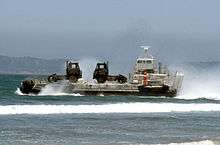LACV-30
| Lighter Air Cushioned Vehicle, 30 Tons | |
|---|---|
 A US Army LACV-30 | |
| Type | Hovercraft |
| Place of origin | United States |
| Service history | |
| In service | U.S. Army |
| Production history | |
| Number built | 25+ |
| Specifications | |
| Weight | 51.34 Meter Tons |
| Length | 23.32 meters |
| Width | 11.18 meters |
| Crew | 5 |
|
| |
| Engine |
2 gas turbines 1800 hp |
| Payload capacity | 30 tons (27.2 Metric Tons) |
| Speed | 33.5 knots |
The LACV-30 class hovercraft were purchased by the U.S. Army to carry heavy loads from amphibious ships to the shore. For logistic transport it was already using the LARC-5 & LARC-15, huge vehicles defined as 'barges on wheels', with 4 colossal wheels. To replace these machines, which did not having a high enough velocity in water, and to transport loads of weight and dimensions are not always sufficient 5:15 tons respectively). Their best virtue was mobility even on the ground, thanks to four large tires. The hovercraft could do better at the price of a much more powerful and expensive engine.
Derived from Bell Voyageur model, a civilian air-cushion vehicle (or hovercraft), the LACV-30 is capable of carrying 30 US tons, or 27.2 metric. The hull is that of a large barge, but behind the deck house at the stern, there are 2 air propellers, which are followed by rudders, while under the hull there is a cushion of air which is inflated by 2 fans. There is a large crane at the bow, with a rectangular structure of typical shape suited to a river barge.
A noteworthy feature of the vehicle is that, if necessary, it can be divided into 15 sections that can be transported and reassembled, and put in the water by its crew. Its speed is not high, there is armament, but the vehicle can carry large and bulky loads. Finally, when it comes down to ground, it can cross if necessary breakers of 2.44 m. The range is 2 hours. The only limitation is the apparent inability to operate in combat operations against armed defenses. The first batch contended 25 LACV-30 ships.
The LACV-30s were operated by 8th and 331st Transportation Companies in U.S. Army's 11th Transportation Battalion from 1983 to 1994. Each company had 12 vehicles [1] The US Navy conducted tests on the LACV-30 from 1985-1988.[2]
External links
References
- ↑ Killblane, Richard; Nalli, Diana. "8 th Transportation Company" (PDF). www.transportation.army.mil. U.S. Army Transportation Corps. Retrieved 19 May 2016.
- ↑ Carisle, Rodney P (1998). Where the fleet begins: A History of the David Taylor Research Center, 1898-1998. Washington DC: Naval Historical Center Department of Navy. p. 502. ISBN 0160873088.